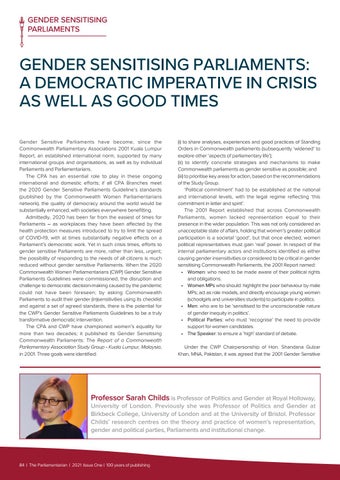GENDER SENSITISING PARLIAMENTS
GENDER SENSITISING PARLIAMENTS: A DEMOCRATIC IMPERATIVE IN CRISIS AS WELL AS GOOD TIMES Gender Sensitive Parliaments have become, since the Commonwealth Parliamentary Associations 2001 Kuala Lumpur Report, an established international norm, supported by many international groups and organisations, as well as by individual Parliaments and Parliamentarians. The CPA has an essential role to play in these ongoing international and domestic efforts; if all CPA Branches meet the 2020 Gender Sensitive Parliaments Guideline’s standards (published by the Commonwealth Women Parliamentarians network), the quality of democracy around the world would be substantially enhanced, with societies everywhere benefitting. Admittedly, 2020 has been far from the easiest of times for Parliaments – as workplaces they have been affected by the health protection measures introduced to try to limit the spread of COVID-19, with at times substantially negative effects on a Parliament’s democratic work. Yet in such crisis times, efforts to gender sensitise Parliaments are more, rather than less, urgent; the possibility of responding to the needs of all citizens is much reduced without gender sensitive Parliaments. When the 2020 Commonwealth Women Parliamentarians (CWP) Gender Sensitive Parliaments Guidelines were commissioned, the disruption and challenge to democratic decision-making caused by the pandemic could not have been foreseen; by asking Commonwealth Parliaments to audit their gender (in)sensitivities using its checklist and against a set of agreed standards, there is the potential for the CWP’s Gender Sensitive Parliaments Guidelines to be a truly transformative democratic intervention. The CPA and CWP have championed women’s equality for more than two decades; it published its Gender Sensitising Commonwealth Parliaments: The Report of a Commonwealth Parliamentary Association Study Group - Kuala Lumpur, Malaysia, in 2001. Three goals were identified:
(i) to share analyses, experiences and good practices of Standing Orders in Commonwealth parliaments (subsequently ‘widened’ to explore other ‘aspects of parliamentary life’); (ii) to identify concrete strategies and mechanisms to make Commonwealth parliaments as gender sensitive as possible; and (iii) to prioritise key areas for action, based on the recommendations of the Study Group. ‘Political commitment’ had to be established at the national and international levels, with the legal regime reflecting ‘this commitment in letter and spirit’. The 2001 Report established that across Commonwealth Parliaments, women lacked representation equal to their presence in the wider population. This was not only considered an unacceptable state of affairs, holding that women’s greater political participation is a societal ‘good’, but that once elected, women political representatives must gain ‘real’ power. In respect of the internal parliamentary actors and institutions identified as either causing gender insensitivities or considered to be critical in gender sensitising Commonwealth Parliaments, the 2001 Report named: • Women: who need to be made aware of their political rights and obligations. • Women MPs who should: highlight the poor behaviour by male MPs; act as role models, and directly encourage young women (schoolgirls and universities students) to participate in politics. • Men: who are to be ‘sensitised to the unconscionable nature of gender inequity in politics’. • Political Parties: who must ‘recognise’ the need to provide support for women candidates. • The Speaker: to ensure a ‘high’ standard of debate. Under the CWP Chairpersonship of Hon. Shandana Gulzar Khan, MNA, Pakistan, it was agreed that the 2001 Gender Sensitive
Professor Sarah Childs is Professor of Politics and Gender at Royal Holloway,
University of London. Previously she was Professor of Politics and Gender at Birkbeck College, University of London and at the University of Bristol. Professor Childs’ research centres on the theory and practice of women’s representation, gender and political parties, Parliaments and institutional change.
84 | The Parliamentarian | 2021: Issue One | 100 years of publishing
